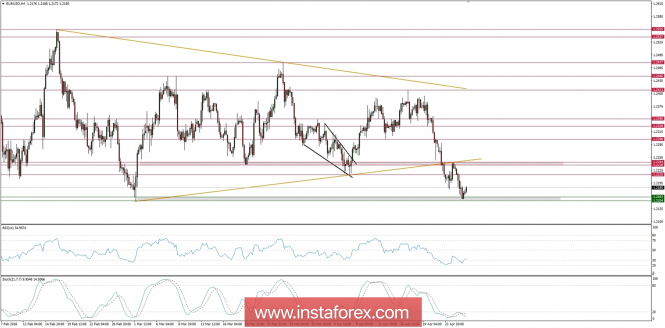The last series of data from the Eurozone economy was below expectations, which would rather stop the bank from tightening the monetary policy. In that case the bank is likely to wait until June. The weakness of the EUR in recent days suggests that the market may focus on the dovish tone of the decision. On the other hand, if the decision is hawkish, it may bring a rebound.
In recent weeks, signals from the central bank have mostly suggested that the ECB should remain "patient and diligent" in policy implementation. In the minutes of the March meeting of the ECB, the emphasis was on a cautious tone and an indication of the risks for the economic outlook. Among the members of the Governing Council, there is a "broad agreement" that there is not enough strong evidence of stabilizing inflation trends, and global economic risks outweigh the negative side, including those related to the risk of trade conflicts. It was noted that the removal of the dovish attitude from forward guidance regarding the asset purchase program "should not be misunderstood" and the Council still leaves the option of reacting to potential shocks.
This message coincided with a series of disappointing data from the Eurozone economy. However, during this period, members of the Governing Council refrained from expressing concerns about decelerating growth, and if they did, they were convinced that the slower growth rate would not hinder inflation in returning to the target. In this context, it is unlikely that on Thursday ECB President Draghi would significantly emphasize doubts about the strength of recovery. It is more likely that the ECB will refrain from assessing the economic situation until it is familiarized with the new set of macroeconomic forecasts available at the next meeting in June.
For the same reason, there is very little chance that this week the Council would decide on the future of the asset purchase program, which also excluded last week's leaks to sources related to the ECB. We can hear from Draghi that the discussion on QE reduction has started and there are many options for what will happen to the program after September, but nothing has been decided yet. Similarly, Draghi should maintain unspecified forward guidance for the date of the first rate hike. The ECB President may be asked for a recent comment from the ECB member Nowotny on the increase in the deposit rate by 20 basis points. We expect Draghi to comment on this as an expression of Nowotny's individual views, and the Council has not discussed this issue yet.
The European Central Bank will publish its decision and statement today at 12:45 pm GMT. Global investors do not expect any changes in the parameters of the monetary policy (the reference rate: 0.0 percent, deposit rate: -0.40 percent, asset purchase amount: EUR 30 billion per month). At 01:30 pm GMT a press conference of the ECB President Mario Draghi is scheduled.
Let's now take a look at the EUR/USD technical picture on the H4 time frame. In the last days the EUR weakened which reflects investors' positioning on the dovish tone of the ECB's decision. Recently, the lack of EUR/USD strength in the exit attempts was the top of consolidation, which suggests that investors were reluctant to buy EUR for fear that the bad run in macroeconomic data would bring about a change in the central bank's bias. Therefore, even if Draghi draws attention to negative risks for growth prospects, it is already discounted in EUR. However, the expected neutral message similar to that of the March conference will mean that dovish positioning is not justified and it may bring a rebound in EUR after the recent depreciation. The key important technical levels are: 1.2154 - 1.2163 (technical support) and 1.2238 - 1.2244 (technical resistance).

